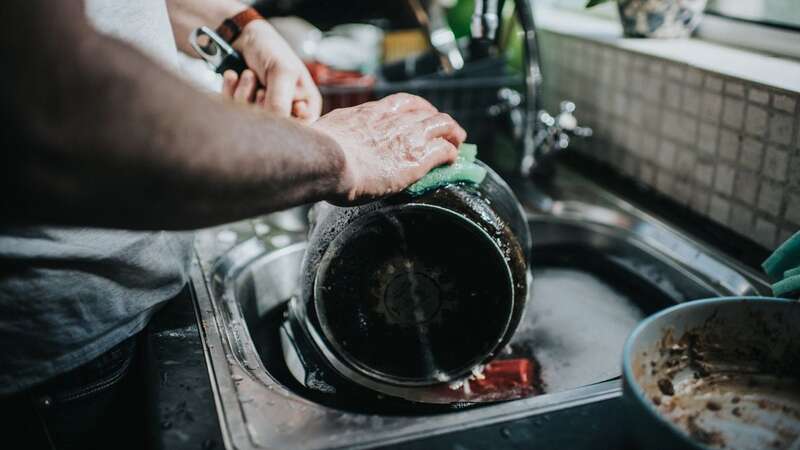

As hundreds of thousands of Brits risk falling into fuel poverty, we compare the cheapest way to clean your dishes.
There's no doubt popping your dirty plates and cutlery into a dishwasher is convenient, but is it cheaper? As soaring energy bills continue to hit cash-strapped Brits, is resorting back to the good old-fashioned way of hand-washing going to help tighten the purse strings?
Using the January 1 price cap of 28.62p per kWh of electricity, and 7.42p per kWh of gas - The Mirror compares the two methods against each other and shares the best practices to help keep your bills down.
How much is a dishwasher?
Whilst many households will already feature a dishwasher - many Brits simply don't have the space or funds to go out and buy a new one. If you've decided to take the plunge or need to replace a broken one - you'll be looking in the vast region of £100 to over £1,000.
When buying a dishwasher, it's important to consider its efficiency rating, which will be graded from a G to A+++(worst to best). This, along with the size of the appliance and model, will directly affect the price. For example, Curry's is currently selling a Russell Hobbs G-rated tabletop dishwasher (which is great for space-saving but not very efficient) for just £290. While a BEKO full-size integrated dishwasher with a C-graded efficiency will set you back £429.
 Six savings challenges to take in 2023 - how you could save thousands
Six savings challenges to take in 2023 - how you could save thousands
How much does it cost to run a dishwasher?
Uswitch told the Mirror that a dishwasher using 0.79kWh per cycle (the UK average) costs 21p per load. Research also suggests that opting for the 'eco mode' on a dishwasher can cut energy consumption by 33 per cent. Using this state, a 0.79kWh cycle would only set you back 14p per load.
If you run a load in the dishwasher five times a week, this would work out at £54.6 on the standard setting, or £36.40 on eco mode. For a less efficient dishwasher using 1.04kWh per load - you'd be spending £72.80 per year, or £49.40 on eco mode.
How can you cut the cost of a dishwasher?
To make the most of your dishwasher, make sure you frequently clean the filter regularly, space your dirty pots out so they're properly cleaned and don't need re-washing, and only put the machine on once it's full. Andrew Laughlin, a dishwasher expert at Which?, also urges households to 'never' rinse their plates.
"Just scrape off the food and put [the pots] straight in," he explained. "Your dishwasher can more than cope with it and it saves on water and energy." Avoid putting sharp knives, wooden items like cutting boards, and vacuum flasks in the dishwasher as this can damage them - resulting in more expensive to replace them.
If you're on an -off peak tariff, it may also be cheaper to put your dishwasher on when the grid is 'under less pressure' and 'demand is at its lowest'. This tends to be from 10pm to 8am. However, reports that those on an off-peak tariff would have to use at least 40 per cent of their electricity at night to actually .
Want the latest money-saving news and top deals sent straight to your inbox? Sign up to our
How much does it cost to hand-wash pots?
Unlike dishwashers, investing in a washing-up bowl isn't going to break the bank. You can pick up one from Wilkos for just £1.69 if you don't already have one. There's also evidence to suggest that the routine of washing pots by hands can be beneficial to your mental health and can reduce stress levels.
But calculating the cost of hand-washing your pots isn't as straightforward, as different homes use different methods to heat water. Some people are also on a water meter, which means the more water they use - the higher their bill will be.
If you heat water with an electric immersion heater, filling a nine litre bowl works out at around 12p a wash. This works out at £31.2 a year, if you wash up five times a week using just one bowl each time. However, the reality is you'll be using much more water and energy than that. Look After My Bills predict washing by hand will add up to £130 a year - making it considerably more expensive than using a dishwasher.
When it comes to water use, Which? states a full-sized dishwasher will use an average of just 2.2 litres of water - whereas hand-washing will use nine. In fact, even the least efficient dishwasher can wash twice as many dishes using the same water as hand-washing your pots.
 I'm a heating expert - eight tips to save up to £1,900 on your bills this year
I'm a heating expert - eight tips to save up to £1,900 on your bills this year
It's much more difficult to calculate how much heated water up costs if you have a gas-heated water tank. Although gas is typically cheaper than electricity, it is worse for the environment and doesn't make for an easy comparison.
How can you save money whilst hand-washing pots?
It's much more efficient to hand-wash your pots using a bowl of warm soapy water, rather than continuously running the hot tap. Avoid rinsing each individual item under the tap and rinse your bowls and plate by submerging them in fresh water if you don't like letting them dry with remaining suds.
Uswitch also recommends pre-soaking 'heavily soiled dishes in a bowl' and resisting from rinsing them under the tap before you start washing up. You can also use washing up products like Fairy Platinum Quickwash which allows you to switch to cooler temperatures.